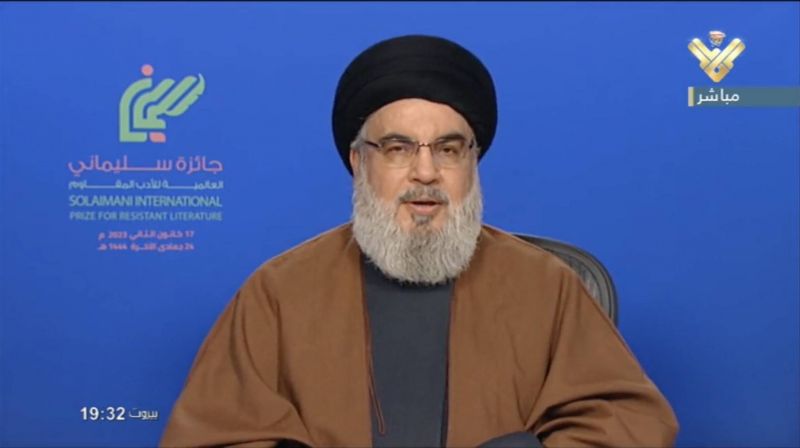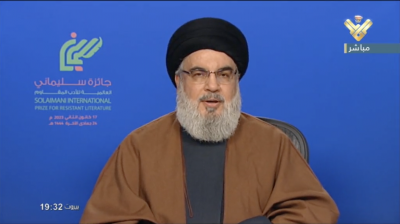
Hezbollah Secretary General Hassan Nasrallah giving a speech on January 17, 2023. (Credit: Screenshot from al-Manar archives)
BEIRUT — Hezbollah Secretary General Hassan Nasrallah gave a live televised speech Wednesday night, in which he ruled out any negotiations on the disputed land border between Lebanon and Israeli authorities.
His words came in response to caretaker Prime Minister Najib Mikati's assertion to the press on Tuesday that Lebanon had informed the UN it was ready to demarcate the southern land border with Israel along the Blue Line.
Hassan Nasrallah's remarks were broadcast just hours after another incident on the border with Israel, in which three members of the party were wounded by Israeli fire after approaching a border security fence.
And on July 6, the Israeli army carried out strikes in southern Lebanon after an unclaimed shell was fired from what it said was Lebanese territory. The exchange of fire caused no casualties but raised fears of escalation at the border.
Nasrallah's speech Wednesday evening had been scheduled to mark the 17th anniversary of the 2006 war with Israel.
Here are the main points of Hassan Nasrallah's Wednesday speech:
On Wednesday's incident on the southern border
"The incident that took place today is under investigation. We don't yet know exactly what happened, as it seems there were several incidents."
On Wednesday afternoon, a few hours before Hassan Nasrallah's speech, Hezbollah members were wounded by Israeli fire in the southern Lebanese town of Boustan. The situation quickly calmed down, but this incident occurred against a backdrop of heightened tensions with Tel Aviv.
On July 6, the Israeli army launched strikes on southern Lebanon after an unclaimed anti-tank missile was fired from Lebanese territory. Hezbollah refrained from commenting on these tensions at the time, though the rocket was reportedly launched by a Palestinian group from Lebanon, according to a senior Lebanese army source quoted in L'Orient-Le Jour.
On the disputed village of Ghajar and Hezbollah tents
"The northern part of Ghajar is an internationally recognized Lebanese land. The United Nations knows that this part is Lebanese."
In early July, Israeli forces absorbed the Lebanese part of Ghajar by placing a fence around it. The disputed Alawite village is located on the border between Lebanon and the Syrian Golan Heights and is divided in two by the UN's Blue Line.
On July 6, Hezbollah denounced the construction of this fence. The party criticized "a total occupation of the Lebanese part of Ghajar by force of arms and a fait accompli."
On Tuesday, the Foreign Affairs Ministry asked Lebanon's Permanent Mission to the UN to lodge a complaint with the UN concerning Israel's annexation of Ghajar.
"For about a year now, the enemy has been erecting barbed wire around this area... And the whole international community remains silent. All this was long before the story of the [Hezbollah] tents. These tents arrived at a time when Israel had already taken all these measures."
"There are two tents. One is in Lebanese territory and the other is in Shebaa. In reality, there is only a problem with one tent."
In early July, Hezbollah set up two tents in the region of Kfar Shuba and the Shebaa Farms, controlled by Israel but claimed by Lebanon. Since then, all-out diplomatic efforts have been made to avoid an escalation.
"The land border is already known ... what is happening at the moment is not a negotiation around this border."
"The Lebanese position on Ghajar must be firm. It's the responsibility of the state, the people and the resistance."
On Tuesday, caretaker Prime Minister Najib Mikati told the Nida' al-Watan newspaper that Lebanon had informed the UN of its readiness to demarcate the southern land border with Israel along the UN's Blue Line. Considered the ceasefire line between the two countries since 2006, this demarcation is monitored by the United Nations Interim Force in Lebanon (UNIFIL).
On the presidential deadlock
"Many have accused the Shiite tandem of wanting to modify the constitution and bring about a division by thirds [Sunnis, Shiites, Christians] ... This is not true. These are lies designed to mislead public opinion."
"If the other parties want to modify the Taif Agreement, we are ready."
"I'll tell you right now: we'll never allow our weapons to be touched. We don't want Hezbollah's weapons to be legalized. Even if this is proposed, we will refuse."
"The guarantee we are asking for is the personality of the president. That, for us, is essential."
"We started a dialogue with our friend Gebran Bassil [leader of the Free Patriotic Movement] but we didn't put an end to it.
"We believe that Sleiman Frangieh is honest, loyal and courageous. These qualities are important to us."
"A dialogue with conditions is not a dialogue. We will go to dialogue with Sleiman Frangieh as our candidate. Present us your candidates... There are no alternatives to dialogue. We are ready for dialogue without conditions."
While Lebanon has been without a president for eight months, Hezbollah is staunchly backing Sleiman Frangieh, leader of the Marada Movement, in the presidential election.
Although Hezbollah regularly calls on other political parties to engage in "dialogue," on the election, it is not giving up on its candidate. At the last parliamentary election session on June 14, Frangieh received 51 votes in the first round, against 59 for former Finance Minister Jihad Azour, who supported by a large part of the opposition.
None of the electoral sessions have resulted in the election of a president.
On the July 2006 war against Israel
"It's important to remember the great and dangerous American project that was this war. The project of the new Middle East. This project, if it had succeeded, would have meant the recognition of Israel by all the countries in the region."
"There are still people in Lebanon who think Israel hasn't lost. But that's none of our business... The resistance won and Lebanon did not submit to American and Israeli conditions."
"Seventeen years later, this feat has been preserved... through the triad of army-people-resistance."
The last armed conflict between the two countries took place in July 2006, pitting Hezbollah against Israeli forces. According to Human Rights Watch, 1,109 people were killed in Lebanon, the majority of them civilians. A further 4,399 people were wounded. On the Israeli side, more than 160 deaths were recorded, most of them soldiers, while hundreds of civilians were wounded.
On the Quran burned in Sweden
"This is a shameful, reprehensible and painful event. This is not a story about freedom of expression. The person who did it is an Iraqi Christian, and I stress the word Christian. It's not a personal initiative, there's something behind it. It's the Zionist way of thinking... We must cut short the discord and not allow ourselves to be drawn into it. Muslims and Christians must help each other not to undermine sacred values, and not to create discord."
On June 28, an Iraqi refugee in Sweden burned a few pages of a copy of the Quran in front of Stockholm's largest mosque, during the Eid al-Adha holiday celebrated by Muslims around the world.
